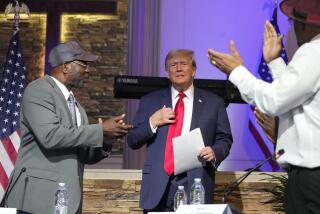Bush, Upset by Criticism, Defends Civil Rights Record : Race relations: He says blacks should ‘be rejoicing.’ Sen. Bradley accuses President of exploiting fears.
- Share via
WASHINGTON — An angry and agitated President Bush defended himself on racial issues Wednesday, declaring that black Americans “ought to be rejoicing” over his civil rights record and his nomination of Clarence Thomas to the U.S. Supreme Court.
Bush, under fire for nominating a black judge who opposes affirmative action, opposing a Democratic civil rights bill and lifting sanctions on South Africa, grew visibly irritated at a White House news conference and said that the attacks on his motives are “grossly unfair.”
The President appeared particularly peeved by a speech given earlier in the day by Sen. Bill Bradley (D-N.J.), who accused the President of exploiting racial fears for political advantage as the 1992 presidential election campaign approaches.
Addressing himself directly to Bush in a speech from the Senate floor, Bradley charged: “You have tried to turn the Willie Horton code of 1988 into the quotas code of 1992. . . . It sounds like you’re trying to have it both ways--lip service to equality and political maneuvering against it.”
Horton, a black inmate who committed a rape after being furloughed from a Massachusetts prison, became a focal point of Bush’s attacks on then Massachusetts Gov. Michael S. Dukakis, his Democratic opponent in the 1988 presidential race. On quotas, Bush maintains that Democratic civil rights legislation would force businesses to institute hiring quotas for minority groups.
“The point on Willie Horton was not Willie Horton himself,” Bush said. “The point was, do you believe in a furlough program that releases people from jail so they can go out and rape, pillage and plunder again? That’s what the issue was. And thank God we have made some progress incidentally in our Justice Department on correcting that.”
Bush, who characterized Bradley as “a very liberal senator from New Jersey,” said that efforts to link the Horton controversy with racial politics is “part of the liberal litany.”
In his Senate speech, Bradley cited the President’s ability to divide or unite the country and challenged Bush to ease racial tensions rather than exacerbate them.
“Why don’t you spend some of the political capital represented by your 70% approval ratings and try to move our glacial collective humanity one inch forward? . . . I’m asking you to take the issue of race out of politics and put it on a moral plane where healing can take place,” Bradley said.
“Racial tension is too dangerous to exploit and too important to ignore. America yearns for straight talk about race but instead we get code words and a grasping after an early advantage in the 1992 election,” the senator said.
Although the President dismissed Bradley’s remarks as an attack from the left, some of the same points have been raised by Sen. John C. Danforth of Missouri, a Republican who--in a more gentle manner--has parted company with Bush over the civil rights bill.
The President’s record on racial issues also was criticized Wednesday by the Rev. Jesse Jackson, the former presidential candidate and civil rights leader, in an address to members of the National Assn. for the Advancement of Colored People in Houston.
“President Bush has raised the specter of race to divide the nation, while neglecting our real economic needs,” Jackson told delegates to the NAACP convention.
“It seems to me that President Bush is a bully and he has us in a buzz saw,” he said. “He continues his race signals and sinister plots, from Willie Horton to quotas to the Supreme Court nominee. If we do nothing, we are humiliated. If we spend all our energy on it, we martyr him.”
Bush’s prickly response to the criticism is in some respects characteristic. While he sometimes has shrugged off political attacks or responded with a joke, he has tended to become defensive when his motives have been called into question.
Bush acknowledged that he was concerned about the continuing criticism of his Administration’s record on racial issues, characterizing the attacks as “this kind of drop, drop, drop of water on a rock.”
“I am going to take my case every chance I get, and this is a good opportunity right here, to black Americans and say, ‘Hey, listen, we’ve got a good record on civil rights and we’re going to continue it and you ought to be rejoicing that we have a very able judge to be elevated to the Supreme Court and similarly on civil rights,’ ” the President said.
“We’ve got a good civil rights bill. Don’t listen to all these people out there that say it’s bad. Put this one into effect,” he said.
The three issues--the Thomas nomination, the civil rights legislation and the South Africa sanctions--seem to call into question efforts made in 1989 by the late Lee Atwater, then chairman of the Republican National Committee, to reach out to black voters.
“If you were a black or a member of a minority,” the President was asked Wednesday by a questioner who cited all three issues, “wouldn’t you think that George Bush is getting away from Lee Atwater’s idea of reaching out to blacks?”
“Yes, I’ll be honest with you, I would,” he replied. “Because if I believed everything you cited, I would be concerned about that. But I think that we will prevail. Frankly, I think Clarence Thomas’ appointment is a good--will be well-received in the black community.”
Referring to recent criticism of Administration actions by the NAACP and other civil rights groups, Bush suggested that “some of these big organizations” do not “speak for (the way) all blacks feel.”
“Yes, there have been some concerns, and, yes, I’d be concerned if constant criticism eroded what I feel is a commitment to civil rights here,” Bush said. “But I--I think, as you put down the appointment of an outstanding black to the court and say . . . (it) shows that we’re not for civil rights. I’m very sorry, I would vehemently disagree with that.”
Bush has argued that a Democratic-sponsored civil rights bill passed by the House and pending in the Senate would force employers to adopt hiring quotas to shield themselves from discrimination lawsuits. The President has urged Congress to pass a rival bill that he favors.
Backers of the Democratic bill, which is intended to overturn a recent series of Supreme Court rulings that made it more difficult to pursue discrimination lawsuits, deny that it would lead to adoption of quotas.
“In terms of a civil rights bill, if they want to pass one, pass mine,” Bush said. “Pass mine. Now. It moves against discrimination in the workplace. And you don’t hear anything about it because others want to do something that we can’t accept.”
While not using the word “quotas” in his attack on the Democratic bill, Bush stated: “I’ve repeated over and over again what the problem is.
“I’d say to some of these critics out there, if you can’t take 100 steps, take 85, 89, and then let’s go back and reason together and try to get the rest done,” the President added.
He also responded angrily to a suggestion by Senate Majority Leader George J. Mitchell (D-Me.) that--by nominating Thomas to replace Thurgood Marshall, the first black to sit on the Supreme Court--Bush in effect was adhering to a quota system.
“This isn’t a quota appointment,” Bush said. “It is the right thing at the right time.”
“We’re taking on some water on this, a little, few shots, but I have an innate confidence that this man will be confirmed and the reason he will be is that he deserves to be confirmed,” the President said.
Addressing his decision Wednesday to lift U.S. economic sanctions on South Africa, Bush said, “I think that’ll go over well.”
Staff writer Sam Fulwood III in Houston contributed to this story.
More to Read
Get the L.A. Times Politics newsletter
Deeply reported insights into legislation, politics and policy from Sacramento, Washington and beyond. In your inbox twice per week.
You may occasionally receive promotional content from the Los Angeles Times.









